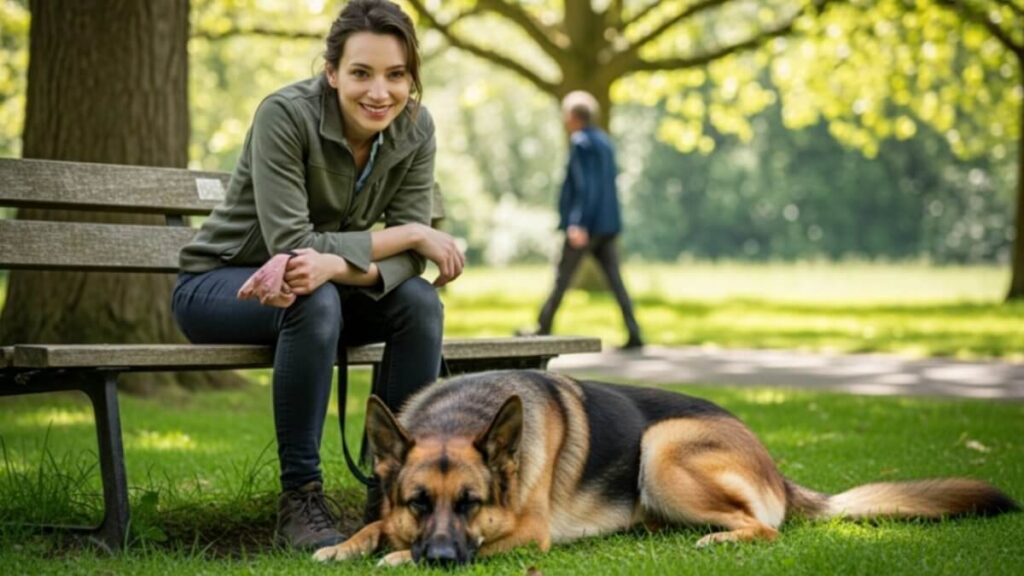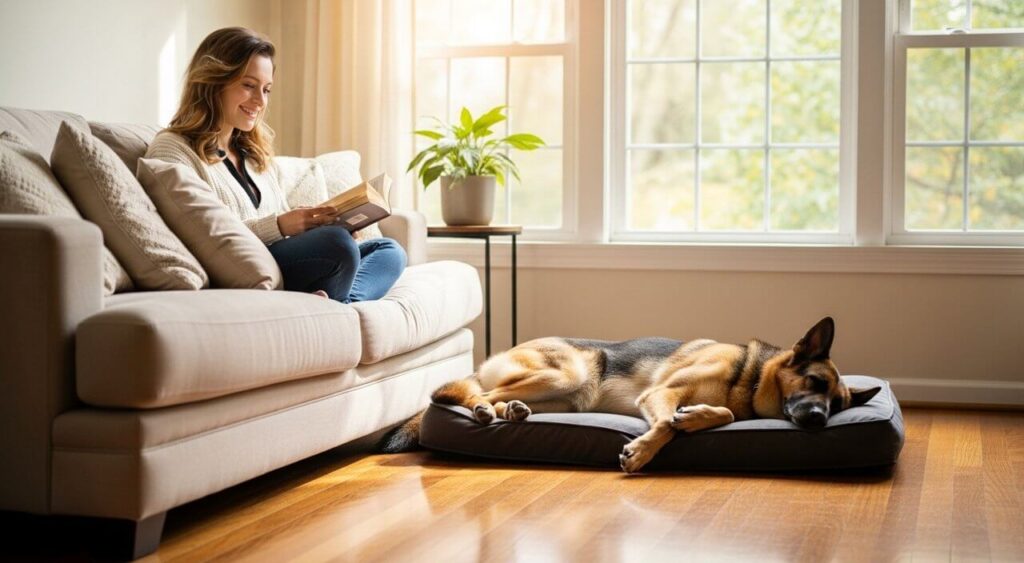That piercing bark that shatters the 3 AM silence… If you’re exhausted from a dog barking at night, you’re not just tired; you’re desperate for a solution. It’s a stressful experience for both you and your dog, and it can leave you feeling helpless.
I want to reassure you that this is a common and solvable problem. The solution does not involve yelling, punishment, or aversive bark collars, which can make nighttime anxiety even worse. This guide will provide a clear, step-by-step plan to help you become a “bark detective,” understand the root cause of the behavior, and implement humane solutions for a quiet, peaceful night for everyone in your home.
Smarter Paws Academy is reader-supported. When you buy through links on our site, we may earn an affiliate commission at no extra cost to you. As an Amazon Associate, I earn from qualifying purchases. Thank you for your support!
Important Behavior Disclaimer
The information in this article is for educational purposes only. If nighttime barking is a new or sudden behavior, or if you suspect your dog is in pain or distress, please consult your veterinarian first. Always consult a vet before considering any supplements or medications for your dog.
Key Takeaways: Nighttime Barking
- Identify the Cause: Nighttime barking is communication. The most common reasons are loneliness/anxiety, alert barking at noises, potty needs, or medical discomfort.
- Optimize the Environment: A comfortable crate in your bedroom, paired with a white noise machine to mask sounds, can solve a majority of nighttime barking issues.
- Never Punish a Night Bark: Using a bark collar at night is dangerous as you could be punishing a dog for a genuine medical need or fear, which will only make the problem worse.
Prefer to Listen? An Audio Overview
For a conversational deep dive into this topic, press play below for my complete audio discussion on nighttime barking.
Runtime: 1 minute 45 seconds
View Full Audio Transcript
Narrator: Welcome to the Smarter Paws Academy audio overview. Today, we’re tackling a problem that can truly disrupt your life: a dog that barks all night. Sandie, what’s the biggest mistake owners make when they’re sleep-deprived and desperate?
Sandie Calloway: The biggest mistake is reacting with frustration by yelling or considering a punishment-based tool like a bark collar. The danger at night is that you could be punishing a dog for a genuine, non-negotiable need—like having to go potty—or for feeling real fear. Punishing that only makes the anxiety around nighttime and their crate much worse.
Narrator: So, if punishment is out, what’s the first step in the right direction?
Sandie Calloway: The first step is to become a “bark detective.” You have to figure out *why* they’re barking. Is it loneliness, especially in a new puppy? Is it alert barking at noises outside? Is it a genuine potty need? Or, especially if it’s a new behavior, could it be a sign of pain or discomfort? The article helps you pinpoint the specific cause.
Narrator: And once you’ve identified the cause, what are the actual solutions?
Sandie Calloway: The solutions are all about creating a safe and secure environment. This includes perfecting a calm evening routine, making the crate the coziest den possible, and using simple tools like a white noise machine to mask outdoor sounds. It’s about proactively meeting your dog’s needs so they don’t feel the need to bark in the first place.
Narrator: So you’re building comfort, not just demanding quiet.
Sandie Calloway: Exactly. You’re not just stopping a noise; you’re building a safer, more secure world for your dog. That is the true key to a peaceful night for everyone.
Table of Contents
Why is My Dog Barking at Night? (The 4 Most Common Reasons)
Identifying the “why” is the critical first step to finding the right “how.” A dog barking in the dead of night is trying to communicate a need. Let’s decode the most common reasons.

1. Loneliness or Anxiety
This is especially common in new puppies who are not yet used to sleeping alone, or in dogs with separation anxiety. The sudden quiet and darkness can be frightening, and barking is their way of calling out for their family. This is where comfort tools can make a world of difference.
2. Alert Barking
Your dog has incredible hearing. That bark might be a response to a raccoon rustling in the bushes, a late-night walker, or the sound of a neighbor’s car door. They are acting as your loyal alarm system, alerting you to potential “dangers.”
3. Potty Needs
Sometimes, the reason is simple: they genuinely need to go to the bathroom. This is a non-negotiable need, especially for young puppies with small bladders or senior dogs who have less control than they used to. Punishing this type of bark is particularly harmful.
4. Discomfort, Pain, or Age
If your older dog has suddenly started barking at night, it could be a sign of an underlying issue. As the Cornell University College of Veterinary Medicine explains, conditions like arthritis or Canine Cognitive Dysfunction (similar to dementia in humans) can cause restlessness and vocalization at night. A thorough vet check-up is essential.
The 4-Step Plan for a Quiet Night
Once you have an idea of the cause, you can implement this structured plan to address it humanely and effectively.
Total Time: 7 days
Perfect the Evening Routine
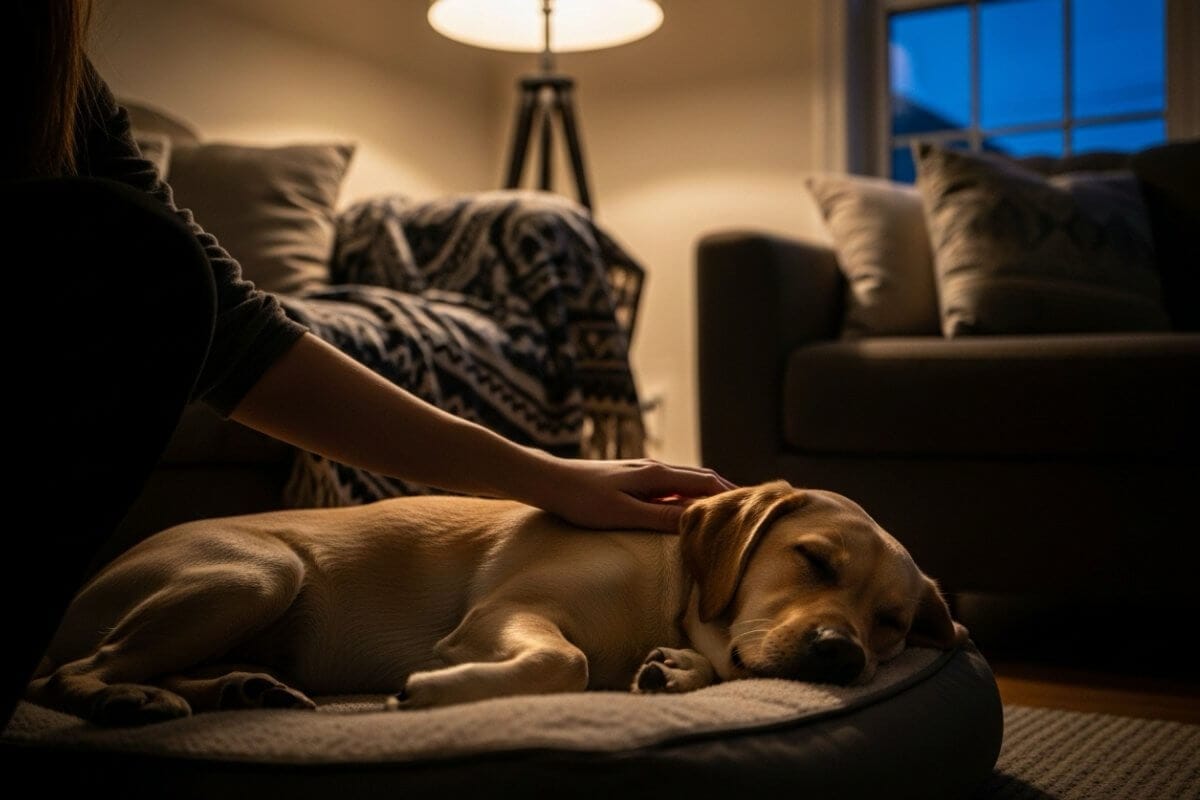
Create a predictable wind-down routine. Include a final, calm potty break and a quiet chew session before bed. Avoid high-energy play right before sleep.
Optimize the Sleep Environment
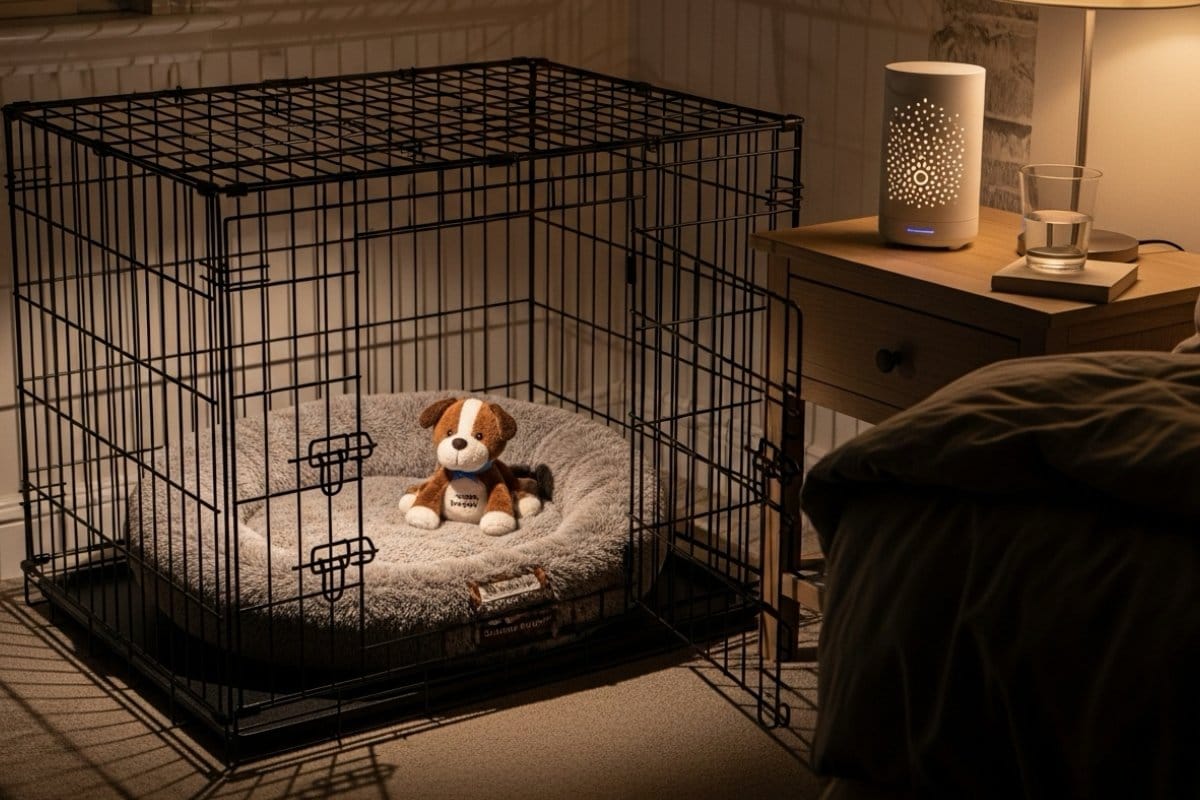
Make the crate a cozy sanctuary with a comfortable bed. Use a white noise machine to mask startling outdoor sounds. For most dogs, having the crate in your bedroom reduces anxiety.
React Calmly and Consistently
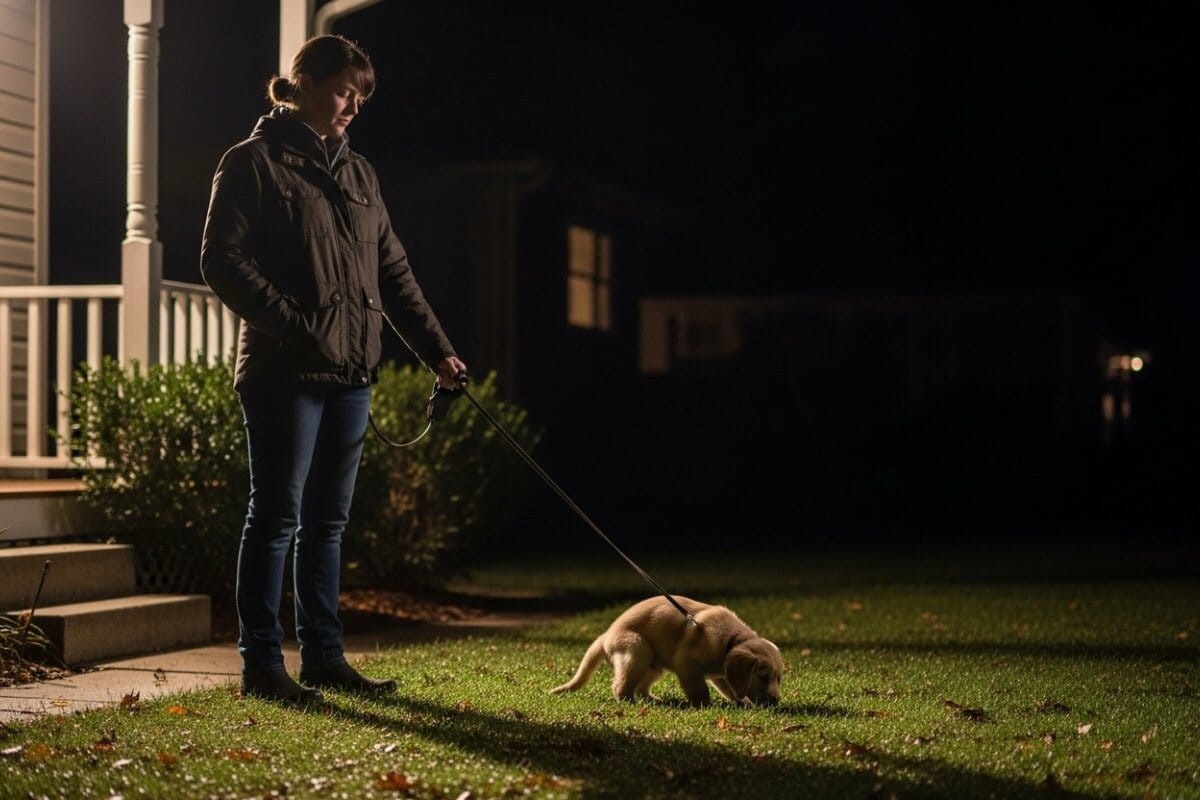
If barking occurs, take your dog out for a brief, no-fun potty break on a leash. Do not talk or play. If you know their needs are met, it is best to ignore attention-seeking barks.
Rule Out Medical Issues

If the nighttime barking is new, sudden, or seems linked to discomfort, your first step should always be a visit to the veterinarian to rule out any underlying pain or medical conditions.
Essential Tools for Peaceful Nights
These are not magic wands, but they are powerful tools that support your training plan and help your dog feel more secure, making a quiet night much more achievable.
For Comfort & Anxiety
This is my #1 recommendation for puppies. It mimics a mother’s heartbeat and warmth, providing incredible comfort and dramatically reducing nighttime anxiety and barking.
The raised donut design of this bed creates a secure, den-like environment. It helps anxious dogs feel safe and protected, promoting deeper, more restful sleep.
For Masking Noise
If your dog barks at every little sound, this is your solution. It masks outdoor noises and even has a sensor that activates when it detects barking, creating a consistently calm environment.
For Your Peace of Mind
Wondering if your dog is truly in distress or just seeking attention? A pet camera allows you to check on them and even use 2-way audio to offer a calming word without reinforcing the barking by entering the room.
For Helping Them Settle
Giving your dog a safe, long-lasting chew when they go into their crate for the night provides a positive association and a calming activity to help them settle down to sleep.
A Critical Warning: What About Medication?
Your search results are filled with questions about Trazodone, Melatonin, and Benadryl. I want to be perfectly clear: As a certified trainer, I cannot and will not give medical advice. Deciding to use any medication or supplement for your dog’s anxiety or sleep is a conversation you MUST have with your veterinarian.
A vet needs to perform a full exam to rule out underlying medical conditions, determine a safe dosage based on your dog’s specific weight and health, and be aware of any potential side effects or drug interactions. Please do not give your dog any medication without professional veterinary guidance.
Frequently Asked Questions (FAQs)
Should I ignore my dog barking at night?
It depends on the cause. If you suspect a genuine need like potty, you should not ignore it. Take them out for a brief, boring potty break. However, if you are certain all their needs are met and they are barking for attention, ignoring the behavior is the best way to prevent it from being reinforced.
What does it mean when dogs bark at 3am?
Barking at a specific time like 3 AM is often triggered by subtle environmental cues you may not notice, such as a neighbor leaving for work, nocturnal animals, or the sound of a furnace kicking on. Using a white noise machine can be very effective at masking these specific triggers.
Should you yell at a dog to stop barking?
No. Yelling often makes barking worse. Your dog may think you are joining in and barking with them, which can escalate the behavior. A calm, consistent approach is always more effective.
Will a muzzle stop a dog from barking?
Using a restrictive muzzle to stop barking is inhumane and dangerous, especially overnight. It prevents your dog from panting (which is how they regulate temperature), drinking, and can cause immense stress and panic. It should never be used as a barking solution.
What can I give my dog to help them sleep at night?
This is a question you must discuss with your veterinarian. A vet can rule out medical issues and determine if supplements like melatonin or prescription medications like Trazodone are safe and appropriate for your individual dog. Never give your dog any medication without professional veterinary guidance.
Reclaiming Your Sleep and Your Dog’s Comfort
A quiet night is the result of a dog that feels safe, comfortable, and understood. By patiently identifying the reason for the barking and providing a humane, supportive solution, you’re doing more than just stopping a noise. You’re telling your dog that you are their safe place, which is the foundation of an incredible bond that will last a lifetime.







